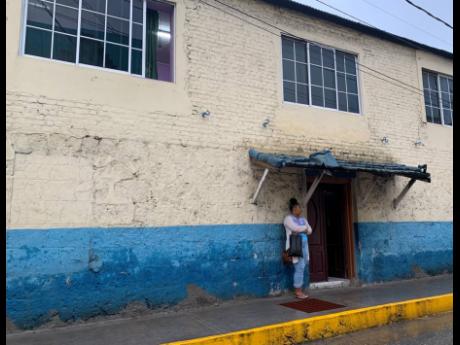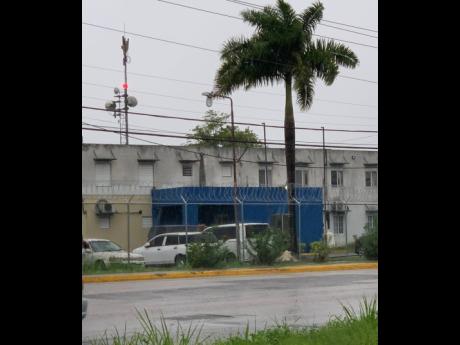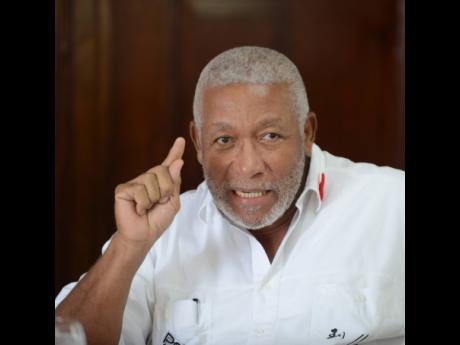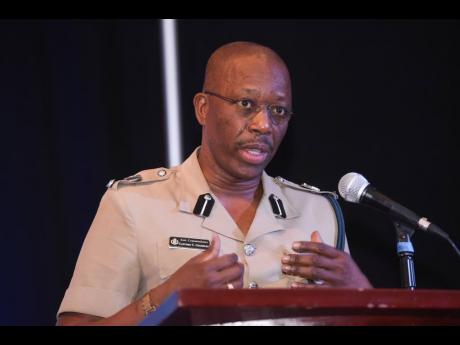Lewin: DCS, not cops, should man lock-ups
Police Fed boss also wants officers freed of cell duties as concerns linger about state of facilities
Former Police Commissioner Rear Admiral Hardley Lewin believes the Department of Correctional Services (DCS) should assume responsibility for all persons detained in criminal investigations or awaiting trial, and the police relieved of duties to...
Former Police Commissioner Rear Admiral Hardley Lewin believes the Department of Correctional Services (DCS) should assume responsibility for all persons detained in criminal investigations or awaiting trial, and the police relieved of duties to manage lock-ups.
Speaking with The Sunday Gleaner last week in the wake of a damning report by the Police Civilian Oversight Authority (PCOA) detailing a long list of concerns from prisoners during inspections conducted in the St James, Trelawny, Hanover and Westmoreland police divisions, Lewin said the current set-up was in need of review.
“I do not believe that policemen should be in the business of manning lock-ups than is necessary,” Lewin told The Sunday Gleaner. “Our police are too valuable and we need them out there where the rubber meets the road, but what is happening now shouldn’t be happening in 2022.”
Corporal Rohan James, chairman of the Jamaica Police Federation, which represents the rank and file of the Jamaica Constabulary Force (JCF), agreed.
He noted that talks for the construction of detention centres to free the police from cell duties were far advanced when Owen Ellington was commissioner, but nothing has happened since his retirement in 2014.
He concurred with Lewin that the police facilities should only have a holding area, where persons are detained before being transferred to a major facility.
“At this juncture, we cannot allow our members to work in those areas, and the Federation is going to give the charge for our members to be extricated from those conditions because such inhumane conditions is taking a toll on their health,” said James.
Of the seven Area One lock-ups inspected by the PCOA, only one met the requirement regarding physical checks of cells, which should take place once daily as per police policy.
The report also raised red flags regarding the documenting of important information in the charge and prisoners’ property books at lock-ups, citing instances in which signatures of witnesses were not affixed or items belonging to detainees were not seen in custody.
The PCOA, which was established in 2006, is a police oversight body that monitors the implementation of the JCF policies and observance of proper policing standards.
102 DAYS OF HELL
John Hall* recalled enduring three months of torment after he was picked up at his gate by the security forces during the state of public emergency (SOE) in St James in 2018.
The 29-year-old computer technician’s first brush with the law was expected to be a routine check of information he gave the investigators, but his release would not come until several weeks later.
“I was at my gate when an open-back vehicle with police and soldiers stopped. They pointed their gun at me, claiming that I looked suspicious,” Hall told The Sunday Gleaner last week. “Just for living in a community that the world expects to only produce criminals, I was scraped up and forced to live in hell for 102 days.”
Hall recalled the cell in which he was held at the Freeport Police Station in Montego Bay as being dark and hot, with poor ventilation and a constant pungent odour.
Rats and roaches roamed the cellblock, adding to his mental and emotional anguish.
Hall said his health deteriorated drastically and he began to have frequent panic attacks.
“I counted the days because I was confident of being released to go back to my work,” the university dropout recalled. “I was not a criminal and I was not involved in wrongs, but I was treated as one.”
Attorney-at-law Michael Hemmings, president of the Cornwall Bar Association (CBA), said his clients also report concerns about the state of lock-ups.
“I can understand that people who are detained are not expected to be placed in a hotel, but at least they must be placed in suitable conditions because every person in custody should be presumed innocent until proven guilty and should be treated humanely,” Hemmings argued.
“But this is not about detainees only. Our police officers are forced to work in these disgraceful conditions and that is unacceptable in 2022.”
There are three major holding facilities in the St James Police Division – Barnett Street, Montego Bay (popularly called Freeport) and the Cambridge police stations.
Female detainees are held at the Cambridge police lock-up and they have voiced their displeasure at the poor state of the facilities.
The Barnett Street lock-up was found to be unsuitable for human habitation prior to the COVID-19 outbreak, but was reopened as a quarantine space for detainees during the pandemic.
“Barnett Street is [still] not suitable for the police to work or those detained,” Hemmings said last week. “The holding area has poor ventilation. Even the guardroom is now in a very deplorable condition.”
Like at Freeport, there is no accommodation for attorneys to interview their clients at Barnett Street.
“When we want to interview our clients, we have to borrow an office and those are not in proper condition either,” the CBA head said. “The Cornwall Bar Association has been pleading for a designated room to interview clients, and at one point, we were asked to talk to clients through the [lock-up] grille, but that would breach the client’s confidentiality and privacy, so we objected.”
WORK IN PROGRESS
There are about 29 holding cells at the Freeport station, most with no proper ventilation, Hemmings claims.
“From memory, at one point, they had up to five people in a cell, so a lot of improvement is needed and the police could do well with the resources to carry out their duties, and we at the CBA are willing to do what we can to assist, but we cannot do the heavy lifting that is required,” he told The Sunday Gleaner.
In 2017, Justice Minister Delroy Chuck admitted that the Government needed to do more to improve the state of lock-ups. This followed a submission from Jamaicans For Justice to the Inter-American Commission on Human Rights, describing local police lock-ups as incubators for the worst types of human rights abuses, including killings and torture.
Assistant Commissioner of Police Clifford Chambers, who is in charge of the police’s Area One, said that JCF policy guidelines are being observed by the cops in the region, for the most part. In instances where there have been breaches, disciplinary action is pursued.
“While we wished we had a facility where persons can move around; that is for another penal institution,” Chambers told The Sunday Gleaner. “If there is an infrastructural issue such as the plumbing, once it is within our budget, we seek to get it done immediately, but the magnitude of some of these problems require the police to write to the appropriate authority.
“So, it would be moved from the local division to the respective unit to facilitate the matter being remedied, but the speed at which those bigger matters are responded to is not something I can comment on; but it does not come back to us, what we will hear is that it is work in progress.”
Name changed.
Highlights from Police Civilian Oversight Authority report on state of lock-ups in Area One
• There were serious occupation health and safety concerns when prisoners-in-custody (PIC) inspections were carried out at the Freeport and Barnett Street lock-ups in St James; the Negril and Savanna-la-Mar lock-ups in Westmoreland; the Falmouth and Clark’s Town lock-ups in Trelawny; and the Hanover divisional headquarters in Lucea.
• Bathroom facilities were in poor condition at all lock-ups. Toilets and showers were in a deplorable state. At one lock-up, only one of five shower facilities was functional, and washbasins were being used as toilets, as the toilets were out of use.
• Poor ventilation of the cells. At one lock-up, only one cell was in use, as the other two were prone to leakage and flooding when it rains.
• Fire extinguishers at all the lock-ups required servicing. Many also had no last-service date.
• There were inadequate physical checks of cells and perimeter patrols and poor records management.
• Of the seven lock-ups inspected, only one met the requirement on cell checks.
• None of the lock-ups properly maintained all four of the major records: the PIC register, PIC cards, charge and prisoners’ property book, and remand book
• Of the most concern was the remand book, where this book was either non-existent or not properly maintained at more than half of the lock-ups. In one instance, this record was last utilised in 2021, and in another case, there were instances where individuals were remanded beyond the lawful 24 hours.
• There were concerns in relation to the documenting of important information in the charge and prisoners’ property book at all lock-ups. There were instances of missing witness signatures and prisoners’ items not seen in custody, monies not recorded by serial numbers, among other issues.




